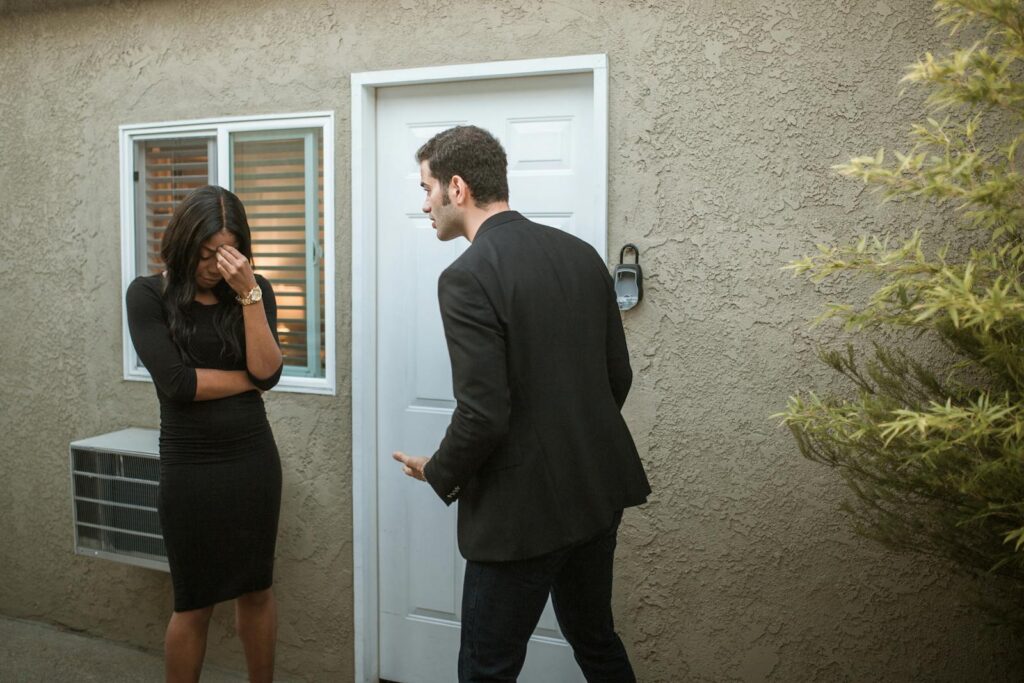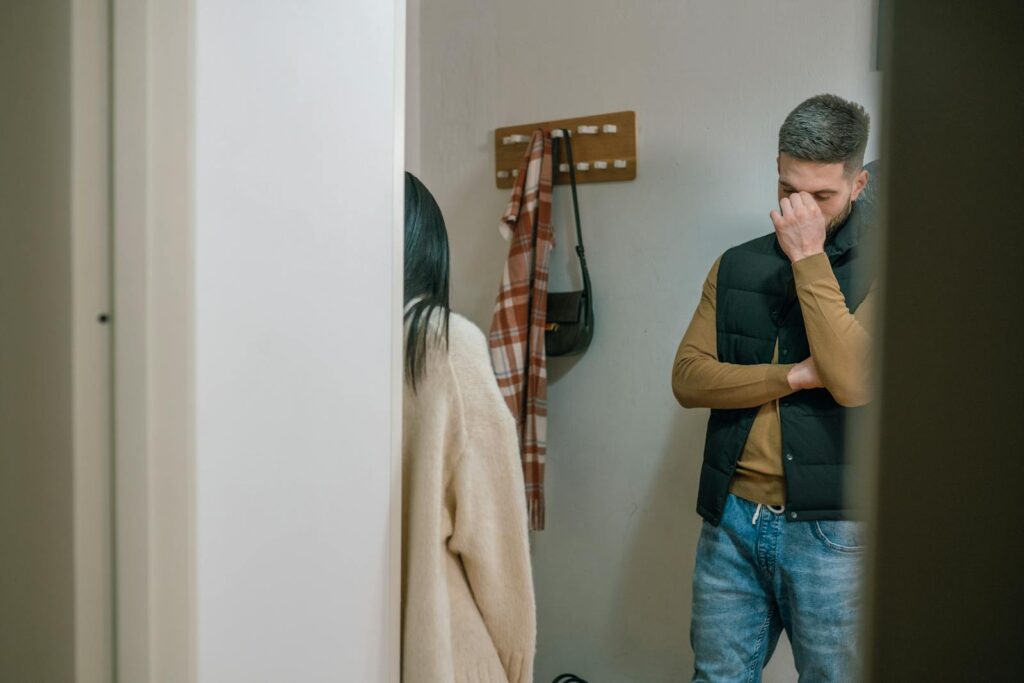
You can usually hear it before you see it. Love doesn’t end with an argument; it fades through the small things people say. Their words grow lighter, safer, less certain. It’s not always cruel—just quieter. There’s a place where warmth once resided. The phrases sound ordinary to anyone else, but if you listen closely, they tell the whole story of someone who’s already halfway gone.
We Don’t Have to Talk About It

When people stop being in love, they start saving their energy. “We don’t have to talk about it” becomes a shortcut to keep things quiet. At first, it feels peaceful—no fights, no long explanations. But soon it turns into silence that never lifts. You lose track of what they think or feel. The house feels full of small pauses. Not talking turns into the only thing you do together.
I Need Some Space

Sometimes it starts with those words. They sound calm, as if someone is trying to clear their head. But space slowly becomes distance. Days pass with less conversation, fewer calls, and new routines that don’t include you. You tell yourself it’s temporary, yet the quiet grows comfortable for them. What began as time apart turns into proof that being alone feels easier. The space never really closes again.
You’re Overthinking It

This one closes the door without slamming it. You’re trying to reach them, to make sense of something that’s shifted, but they deflect it. They don’t want to be burdened with your questions. It’s easier to call it overthinking than to admit something’s missing. The conversation ends quickly, leaving that half-finished feeling—like you dropped something fragile and they didn’t notice.
I’m Just Tired

Everyone gets tired, but this kind is different. It’s not from work or sleep—it’s emotional fatigue. They stop trying to connect. The couch becomes their place of refuge, and small moments that once mattered don’t even register. You watch them move through the house more slowly, not from exhaustion but indifference. “I’m just tired” is really code for “I’ve stopped trying.”
You Know How I Am

It’s a defense that shuts you out. When love fades, effort fades too. They use this line to avoid change, keeping distance under the guise of self-acceptance. It sounds familiar, almost comforting, but what it really means is they’ve stopped showing up. You used to feel like you were learning them; now it feels like they’ve stopped letting you in.
It’s Fine

These two words can carry more emptiness than silence. “It’s fine” used to mean calm after an argument. Now it means nothing is worth fighting for. The way they say it—flat, practiced—tells you everything. The conversation dies there, and so does the closeness. You can almost hear the click of a lock that wasn’t there before.
I Still Care About You

It’s what people say when they’ve already made peace with leaving. The care is real, but the warmth is gone. They say it to soften the fall, to make parting sound gentle. You can hear the distance in their voice, the kind that doesn’t plan to return. Caring is what’s left when love has stepped aside. It’s comfort, not connection, and it always comes too late.
You Deserve Better

It sounds kind, even selfless, but it’s really a quiet confession. They’ve already stepped out in their mind. The guilt starts to speak before they do. When someone says this, they’ve decided to leave—they just haven’t found the words to make it final. It’s the kind of tenderness that hurts more than anger ever could.
I Don’t Want to Fight Anymore

There’s a point where they stop defending anything. It’s not peace—it’s surrender. They claim they don’t want to fight, but what they really mean is that they’ve stopped caring about being understood. The room feels heavy with what’s unsaid. They walk away, leaving the sound of unfinished sentences hanging in the air like smoke that won’t clear.
We’ve Just Changed

Change becomes the excuse that makes distance sound mature. They say it softly, as if it’s mutual. But deep down, you know it’s not change—they don’t feel the same. They say it like the weather, something that happened naturally. You nod, pretending to agree, though you both know it’s not time that changed everything. It’s love that thinned out quietly.
I Need to Focus on Myself

There’s nothing wrong with self-focus, but this one carries a certain finality. They use it when they’re halfway out the door. You start noticing small separations—their own playlists, their own meals, nights they turn in early. They’re building a life that no longer includes you, piece by piece. By the time you notice, it’s already built.
I Don’t Feel Like Talking Right Now

It’s easy to mistake this for needing rest, but it usually means something deeper. They’ve run out of words that feel worth saying. You ask a question, and they nod or shrug. The silence stretches longer each night until it starts to feel normal. The things that once filled the space—stories, small talk, laughter—stop coming. You can feel them pulling away without ever moving.
We’re Just in a Rough Patch

Sometimes people say this to reassure themselves, not you. The words sound hopeful, but their eyes give away something else. The patch doesn’t feel temporary—it feels like the new normal. You wait for the better days to return, but they stop coming. The phrase becomes a script you both keep repeating because silence feels worse.
I Don’t Know Anymore

That uncertainty sits in their tone more than their words. They look at you but don’t really see you. They pause before answering, buying time to hide what they already know. “I don’t know anymore” doesn’t mean confusion—it means resignation. The kind that doesn’t shout. It just lingers, like the sound of a half-closed door.
I Miss How We Used to Be

It starts as a harmless thought that keeps returning. They think about small moments that don’t happen anymore. But they don’t reach for them. Missing the past feels safer than trying again. They remember a version of love that no longer fits. The warmth is familiar, yet distant.

